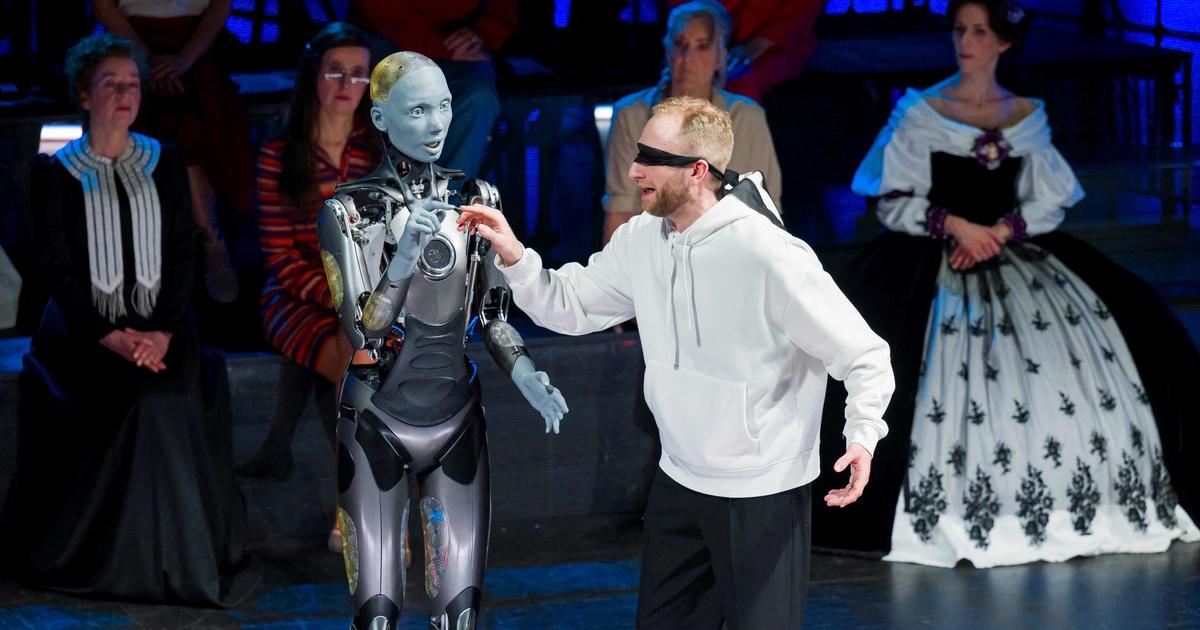An opera also visible in the metaverse,
“metahumans”
and even a robot on stage: with the oratorio
The Creation
of Joseph Haydn, exceptionally staged, the Opéra national de Lorraine overturns the codes of lyrical art and transports the viewer in a very contemporary world.
The imposing opera hall, based in Nancy, is obviously accessible to spectators with tickets... But not only that.
Others can join her on their computer or from a virtual reality headset to witness this unusual performance.
By virtually entering the building, the spectator discovers different mediation posters, allowing him to understand the show he is about to see.
Then he takes his place, always virtually, in this parallel world that is the metaverse, in the room.
The performance, performed and filmed live, is therefore entirely broadcast remotely... And metaverse spectators can
“ask as friends”
and interact with each other.
They can also move around the room, or jump from the balcony...
Also read: A metaverse project inspired by Ready Player One launched... to the delight of “consumers”
On site or from a distance, spectators will not fail to observe the arrival, at the same time as that of humans in the origin of the world, of
"metahumans"
, on either side of the scene: faces of famous scientists broadcast on the screen reproduce live the expressions of the opera singers, via facial recognition software.
We can therefore see false faces from artificial intelligence on the screen, and believe that they are the ones who have the voice of the soprano Julie Roset:
Creation
ultimately continues, with humans 2.0.
Humanoid robot
A horse or a cow modeled in 3D, the
“metahuman”
of the theoretical physicist Albert Einstein... The director Kevin Barz wanted, inspired by the biblical genesis of the world, to associate it with scientific history and to the progress and challenges of the 21st century.
Another great novelty, or small revolution in the world of live performance: before the end clap, a humanoid robot is transported, carefully, by four technicians, on the stage.
Ameca, who blinks like a human, moves his arms and opens his mouth in a most natural way, made his debut on the opera stage, although until now he was mostly used behind the scenes science fiction films.
A scientific and technological partnership has been concluded with OFFIS (Institute for Information Technology, University of Oldenburg, Germany) for the provision of Ameca.
Present not simply to amaze the public, the humanoid is in perfect harmony with the choices of Kevin Barz, who questions, in the show, scientific evolution but also the border between humanity and digital.
The oratorio
Die Schöpfung
(
The Creation)
was premiered at the Burgtheater in Vienna on March 19, 1799. Oratorios, vocal music with religious themes, are not usually adapted for the stage.
Young audience
Another reason this color-rich opera house, whose stage is made entirely of LED video walls, was created this way is
director Kevin Barz's
"concern" about the
"growing skepticism in the world about respect for science
,” he explains, quoted in a press release.
Educational, gentle, the adaptation of this oratorio tells, in its first two acts, the creation of the world, from chaos, to the firmament, to the seas, to plants, to humans.
Next, Adam and Eve sing of their happiness, but must be warned.
For the Opéra national de Lorraine, the challenge of appropriating these new technologies is high: deployment in the metaverse or even rebroadcast, in the metaverse and on the live video broadcast application Twitch, with two “ streamers”, should also raise awareness of opera among young audiences.
The next performances, from February 18 to 23 (Sunday, Tuesday, Thursday and Friday), are open to the public on site but also in the metaverse, with the possibility of connecting from a computer or a virtual reality headset.
Viewers will be able to continue viewing this digital twin in the metaverse until the end of the 2023-2024 season.

